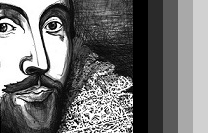Monday,11,2019
Sudip Chakroborthy is a thespian and academician from Dhaka, Bangladesh. He is a freelance theatre director and teaches at the Department of Theatre and Performance Studies, University of Dhaka.
Interviewed by Rudrani Gangopadhyay. 
Engagement with formal education. Medium of instruction for formal education. Institutions and milestones.
I am a student of Theatre and Performance Studies at the University of Dhaka. My theatre journey began with group theatre in a village in the outskirts of Dhaka in 1995. Then, I went on to finish my undergraduate and postgraduate degrees at the university, after which I started teaching at the University of Dhaka from 2006.
First encounter with Shakespeare.
When I was a student in my first or second year, I was performing Othello for class productions. And then, in my third year, I designed the play Macbeth.
Subsequent significant early encounters. Details. Impressions.
Later, I also saw performances in various parts of Bangladesh and in England. I never worked solely on Shakespeare. My significant experience of working with Shakespeare comes from my production of Macbeth, which I am doing now. I designed and directed the play, primarily in the tradition of indigenous Bangladeshi theatre.
If I may ask, why Macbeth?
Macbeth is really very much similar to the political situation of our country in the last four decades. It resonates with the situation of our country as well as other third world countries which are run by the army, who opted for army rule which later boomeranged on them.
In our country, in 1975 we lost the Father of our Nation, Banga Bandhu Sheikh Mujibur Rahman. After that, we lost the General in 1977. And after that there were deaths, one after the other. So the situation is similar to that of Macbeth, with Duncan dying and then one death following after the other. So in a way, Macbeth is our mirror.
In all these years of working with Shakespeare, what has been your impression?
Shakespeare and Tagore are my two foci. I see myself through their plays, through their writings and creations.
Did you face any difficulty in the process (as regards linguistic and cultural differences)?
I worked in Bangla, but there was no problem.
Now I am working with a production of Taming of the Shrew in London with British Bangladeshis. This is a musical in Sylheti. But I have never found any difficulties.
I transferred the cultural differences through my vision. The style is influenced by my experience with indigenous theatre.
When did your production premiere?
February 2012.
What challenges did you face with the texts at the time of production? Editions, language, comprehension, interpretation, translations or translating the text.
I have had the dream to make a Shakespeare play, especially Macbeth, for the past 6-7 years.
I was in London when I saw this production entitled Mother of a Brown Boy. They only used these few boxes on the stage to do and say so much. This inspired me to make the set for Macbeth as a chessboard made of these detachable boxes. Macbeth is very much a play about power, so the chessboard becomes very important. At the same time, the board breaks down as the boxes become so many things throughout the play. I wanted to bring out the whole game of Macbeth through these boxes and the chessboard.
The problem was how I would work with something so complex for these newcomers who had no background in theatre. I made them see Kurosawa’s Throne of Blood and a few other theatre DVDs that I had got from the UK about physical movements, dance-based theatre etc. After two months of workshop, I felt that we were ready to start working on the production.
Did you translate the text yourself?
No, Shamsur Haque did. He is one of the most prominent playwrights in our country and works with verse-plays very well.
Do you know which edition of Macbeth he used for the translation?
Not sure.
In terms of the culture-specific details or the nuances of the language, how do you suppose his translation was?
It was fantastic. Absolutely brilliant and very moving.
But I have also transformed the translation. The idea of the repeated use of a voice saying, ‘Be careful of the step’ in the background is something I incorporated from this movie I had seen.
What were the changes you made in the text?
I tried to avoid identifying the supernatural figures as ‘witches’, because calling her a ‘Dakini’ (witch) is necessarily misogynistic. So instead, I called it a supernatural force. I interpret these things as Macbeth’s hallucinations, which are also his own desires, and then he says that the supernatural forces tell him these things in his letter to his wife.
Also, I removed the scene where Macduff’s family, his wife and kids, get killed. This was because of an infrastructural problem. I wanted the team to be small, and had only one woman in the team, who played Lady Macbeth. So I removed the actual scene where Macduff’s family is killed. Receiving of the news is enough.
Have you consulted anyone for dramaturgical advice?
Yes. We used Mr. Sanjeeb Kumar De, who is one of my postgraduate students specialising in Shakespeare.
Did you instruct your co-artists to watch or research other productions?
I encouraged them to see film versions of Othello and Hamlet, and then, there was Throne of Blood.
Did you research the socio-historical context?
I got the historical context from Eric Jones, who writes about contemporary politics in Britain. I also researched online extensively.
I inherently knew the socio-historical context of 20th century Bangladesh, which we talked about a lot within the group.
Did you consult literary criticism and scholarship on the play, and encourage your co-artists to do so?
We did not research any literary criticism on the play.
Do you think a Shakespeare text is still relevant for performance or does it need to be made stage-worthy by some pro-active intervention?
Yes, very much so. Shakespeare remains relevant to us because of the political aspect, especially in countries which are still struggling to find a place of their own. Of course, one needs to intervene with the text for sure, to adapt it to different scenarios and make it more and more relevant.
For example, I work with a Stanislavskian method. And I worked with a play set in a Bangladeshi context. However, my play is still a faithfully Shakespearean play even then. Shakespeare’s text is abstract to me. The acting method is based on Stanislavsky. I bridge the gap between the abstract and the absolute.
Many adaptations insert extraneous subplots and other material for various reasons. Your stand on this method/process. Do you consider this approach unfaithful to Shakespeare?
They are absolutely faithful to Shakespeare’s script. I have seen a number of Shakespeare plays in Glasgow and London, and I have found them all to be inherently faithful to Shakespeare’s writing.
Sexuality in the plays. Did you face any problem working with others or presenting it before an audience?
I did not emphasize the sexuality of Lady Macbeth at all. I did not see it to be necessary in her characterisation. Sexuality is a private matter.
Is there a trend to deglamourise Shakespeare? How do you read it?
Not in Bangladesh. There is no such trend.
How would you read the trend of adapting Shakespeare in the modern context? What do you think are its implications?
I think adaptations are very necessary. No text can possibly continue to play on stage: the places differ, the times differ, the style of work differs. Playwrights as well as directors have to take this into account.
In Bangladesh, there has been an adaptation of The Tempest by people who work in tea gardens. There has been yet another adaptation of Tempest in Dhaka itself which is in Manipuri style. Everyone is taking their vision and merging it with that of Shakespeare. The best thing about Shakespeare is how, like Tagore, he is very open.
I thought I would do Shakespeare in the tradition of my own country. I imagined it on an open stage with small props, which, incidentally, was similar to Shakespeare’s own time. Performances at the Globe happened in the open, with very little props.
